- Home
- Connilyn Cossette
To Dwell among Cedars Page 7
To Dwell among Cedars Read online
Page 7
We stayed far enough behind the parade of chariots that none of the men noticed us, or if they did, they saw no danger from the two children shadowing the procession. But Lukio took great pleasure in keeping watch, hissing at me to duck down every so often whenever he saw one of the men turn back to survey the road behind them.
The cows continued to meander back and forth like drunkards, but had not stopped moving forward. Somehow they remained on the well-beaten trade road, even without a driver to keep them on task.
The foothills rose up around us, each summit higher and more imposing, as the sun reached its high point. This was the area Azuvah had called the shephelah. My legs ached from the upward climb, and I wondered whether the wagon would ever reach a destination, or if the cows would continue walking through the afternoon and into the night. By now we must be deep into Hebrew territory, and I could not understand why the kings of Philistia were still following behind the wagon when our enemies may already be aware of the strange caravan heading their way.
Without warning, the chariots stopped moving forward just below the top of a ridge. The five kings stepped out, and, accompanied by a number of their men and the two priests, they hiked up a hillside that overlooked a wide and fertile valley. After removing their distinctive headdresses, they squatted down behind a few boulders and watched the wagon as it continued on.
Spotting another outcropping of boulders up above them, I led Lukio in that direction with a warning to stay quiet as we crept through the thick trees and up the hillside. We settled in a gap between two enormous granite rocks, out of sight of the Philistines below but near enough that their voices echoed back to us.
“Will they accept the gifts?” asked one of the kings.
“The gods have foretold that they will. Both the bones and the entrails have made that very clear,” said one of the priests, a man I remembered from my uncle’s lavish feasts. “Besides, that is no small offering inside that wagon.”
“Any amount of gold is worth ending these plagues,” said another king. “Otherwise our cities will be laid waste.”
The king of Ashdod muttered something under his breath, shaking his head in obvious disagreement. With his jaw locked and a scowl on his face, he began to push to his feet, but the king next to him, one with a thick head of silver hair, grabbed his arm and pulled him back down.
“I have no interest in watching this foolishness,” said the seren of Ashdod.
“We wait, Nicaro,” said the older king, his tone brooking no argument. “Your father would have agreed.”
“I am not my father,” said Nicaro.
“No,” said the older man, his eyes narrowed. “No, you are not.”
Although the seren of Ashdod went stiff at the blatant slight, he remained silent and did not retreat.
Far below us, the cow-drawn wagon had meandered off the road and into a golden-brown field of ripe wheat. After so many hours of bumping along on the pitted and scarred path, half the linen covering had slid away, and the sparkling wings of one of the otherworldly creatures were plainly visible, glittering with strange magnificence in the bright sunlight. I watched in fascination as the vehicle that had carried the gold box from Ashdod to Gath to Ekron to this valley plowed through the gently waving stalks.
Then, in the distance, I saw a group of men—farmers bent over in the field, harvesting the wheat with sickles. One of them noticed the wagon approaching and let out a shout to alert his companions. The cows finally came to a halt near a flat boulder that sat near the center of the field, as if that had been their destination all along.
“Should we go now?” asked one of the kings. “It’s in their hands now.”
“No,” said the silver-haired king. “Not until we know they aren’t planning to turn it around and send it back. I want to assure my people that it has no chance of returning.”
Soon the entire group of farmers had congregated near the wagon, some looking up to search the hills around, their sickles still in hand, as if guarding against attack. But then one of them reached over the lip of the cart and slipped off the rest of the linen, revealing what lay beneath.
As if in one accord, the group of them darted away, gathering about fifty paces from the wagon, their animated gestures making it clear they were discussing what to do with the treasure that had been returned to them. After a while, a few of them ran off, headed toward the town in the distance.
The Philistine kings then slipped away from their perch overlooking the valley, quietly making their way down the hillside to their chariots, slinking away like dogs with their tails tucked firmly between their legs. The seren of Ashdod trailed behind the rest, a troubled expression on his young, handsome face as he took one last look over his shoulder toward the valley.
“Shouldn’t we follow?” Lukio said as he watched the kings and priests mount their chariots and turn them back toward Ekron.
My chest ached as I watched the last of our countrymen drive away, leaving the two of us alone in enemy territory. Perhaps we should turn back as well. It had only been a few hours’ walk between Ekron and this valley, after all. But I’d obeyed Azuvah this far, and I would not stop now.
Besides, the draw that golden box had on me since the very first moment I saw it had not relented. Even across the valley I could sense it calling to me. I imagined the winged creatures atop its cover were whispering my name, imploring me to press on in spite of the danger.
One last shred of courage curled around my spine, lending me strength.
“Azuvah said to remain with the Ark,” I said, hoping that Lukio could not see my hands shaking in my lap, nor sense the double-mindedness beneath my show of certainty. “And that is what we will do. No matter what happens, we stay.”
Eight
After eating most of the remaining fruit in our satchel, we decided that it would do us no good to remain perched up so high. None of the farmers that remained near the wagon had noticed us, so I led Lukio down the hillside, staying within the cover of the trees and picking my way carefully down the steep incline. But just as we neared the valley floor, I skidded on a patch of loose stones, my foot twisting as I pitched backward and landed hard on my elbow.
“Risi!” gasped Lukio, darting to my side.
“I’m all right,” I lied, squeezing my eyes hard against the hot prickle of tears as I gripped my ankle and swallowed down the sob that threatened to burst from my lips. Worry furrowed deep between my brother’s brows, and his gaze flew back toward the bend in the road where we’d last seen the kings of Philistia.
“Give me your hand,” I said. “I need help standing, but I can walk.”
With his lips pressed tightly together, my brother pulled me to my feet, then slipped his arm around my waist, doing his best to prop me up as I gingerly hopped forward.
With a grim expression that belied his years, Lukio helped me hobble toward a stand of trees at the edge of the valley, where we found a well-protected narrow gap between the largest of the sprawling oaks and the crumbling stone wall of what looked to be an abandoned sheepfold.
Dropping our satchel on the ground, I sat and propped my back against the tree trunk, sighing in relief and grateful for the shade. Both of us were panting, soaked in sweat, and covered in dust from head to toe. Moisture pricked at my eyes as my twisted ankle and bloodied elbow throbbed in tandem. I squelched the urge to let the tears fall, determined to be calm for my brother and not stoke his fears any higher than they already were.
“Where do we go now?” asked Lukio, slipping his hand into the satchel for an apple.
“I don’t know,” I answered honestly, examining the abrasions on my elbow and restraining a hiss as I brushed away the tiny blood-encrusted pebbles that had lodged themselves into my skin. “Azuvah told me to follow the Ark, so I suppose we wait.”
Lukio frowned. “We should go back to Ekron.”
The same thought had cycled through my mind again and again. I did not know how to explain why I felt certain we shou
ld stay when I could not reconcile it even to myself. I just knew we must not retreat. At least not yet.
Voices echoed across the valley, so Lukio and I peered over the crumbling stone wall to where the wagon sat only a hundred paces from our hiding place.
A large group of people had joined the farmers, mostly men dressed in white garments, but there were women and children among the numbers as well. A few of the men removed the Ark from the wagon, using the poles attached to its sides, and placed it atop the boulder that stood at the center of the field, as if the flat-topped rock had been laid there for the purpose of serving as a sacred bamah.
Once the golden object rested securely, another group of men unhitched the cattle from the wagon. Then, to my great shock, one of them unsheathed a knife and with swift efficiency slit the throats of both cows, watching dispassionately as they dropped heavily into the dirt one after the other. Then he, along with a few others, began the grisly task of butchering the unfortunate beasts. I’d seen many bloody carcasses in the marketplace—goats, sheep, dogs, pigs—and the sight never bothered me before, but somehow watching the men at work gutting, skinning, and slicing up cows whose calves were likely still bawling for their milk made my stomach curdle. At the same time, another group of men began to break apart the wagon, and the rest of the people scattered around the valley, gathering rocks.
“What are they doing, Risi?” asked Lukio, his mouth full of fruit.
“I don’t know,” I replied, reaching out to brush juice from his chin. “Building something, it would seem.”
We watched the group arrange the rocks into a pile that swiftly grew larger with so many hands working together. Stone by stone, an altar formed near the boulder upon which the golden box was perched.
As the sun slid behind the hill at our backs, the men constructed a fire atop the makeshift altar and laid the carcasses on the flames. The enticing smell of roasting meat wafted on the breeze, making my stomach protest. More people from the city had gathered but stood some distance away from the boulder, seeming fearful of coming any closer. But the sounds of celebration reached my ears—laughter and song and the screech of a few children playing a game of chase on the far edge of the valley. A few pipes and drums echoed across the field, and a circle of women took up a joyful dance as the first star of twilight winked into sight and the full moon peered over the horizon.
The group of white-clad men was now circled around the boulder, facing the golden box. Four of them carefully lifted the lid with its winged creatures, most likely to ensure that my people had not removed its contents. Azuvah had told me what was inside—magical food and a staff that bloomed with almond blossoms and stone tablets upon which Mosheh had chiseled important laws—none of which the kings of Philistia would have any interest in, even if they had opened the box.
“I’m hungry, Risi,” said Lukio. “That meat smells so good.”
“That it does,” I said, my own belly snarling in agreement.
A rumble in the sky jerked my attention away from my brother, who’d found a few leftover olives at the bottom of the satchel and was making short work of devouring them. A cloud had formed over the golden box, an otherworldly swirl of color and light that looked like no storm I’d ever seen. Another roll of thunder echoed across the valley, one that grew louder and louder instead of fading away. All the hair on the back of my neck, my scalp, and my arms rose as a crawling sensation moved over my skin like water. I was simultaneously struck by an urgent need to flee and the feeling that a heavy weight was pressing down on me from above.
Lukio buried his face in my shoulder, trembling. “Is the earth shaking again?”
Before I could answer, a brilliant light flashed above the Ark, one that seemed to come directly from the void between the wings of the creatures on its lid. The light suddenly shattered, snaking into a hundred threads of blue-white light, and between one blink and the next, every man who was standing around the box had been struck down, their bodies smoking where they lay.
Clapping a hand over my mouth to contain the shriek of horror that ripped up my throat, I dropped my head, squeezing my eyes shut as I yanked Lukio down to the ground behind the stone wall.
“What is it?” he squeaked.
“Shhh.” I petted his head, whisking my fingers through his thick curls, again and again, hoping to keep him calm but unable to brush the terrible sight I’d just witnessed from my own mind. My stomach churned with nausea as I rocked us both back and forth. “We are all right,” I said, needing the reassurance just as much as he did. “We are safe.”
But the keening cries that went up in that moment and the terror-stricken shouts that followed told a different tale. Although the fire seemed to have consumed the men around the makeshift altar and the Ark, many townspeople had been spared. The sounds of their panicked voices and the shrieking of the children moved farther and farther away as we huddled against the stone wall. The survivors were fleeing the carnage, but Lukio and I were trapped here by my injury and were now exposed to whatever had just slaughtered so many men a hundred paces away.
I had made the wrong choice. I’d followed an old woman and her wild dreams, leading Lukio directly into unspeakable peril. Perhaps, as Mataro had accused many times, Azuvah had been touched by madness. I should have stayed in Ekron, hired myself out as a servant, begged for scraps, let Lukio toss dice—whatever it took to stay alive.
With my arms wrapped tightly around my brother, I continued rocking us back and forth, whispering into his ear, “We are safe. It is over.” Meaningless words that I did not believe as darkness descended over us like a shroud.
When my brother finally succumbed to exhaustion, his body going slack in my arms, I laid him on the ground and pulled out the wool blanket to tuck around him. For as frightened as I’d been last night when we slept in the cradle of the olive tree, my terror now was tenfold. Something far more dangerous than wild animals waited out there in the dark tonight.
Giving in to my morbid curiosity, I sat up on my knees and peered over the stone wall. The moon was high now, casting its brilliant gaze over the wheat fields and illuminating the golden box, but thankfully the charred bodies were hidden in the shadows. Contrary to Azuvah’s assurances, there were no tall and lovely cedars in this valley where Lukio and I would find rest and peace. There were only horrors and death beneath the open sky.
The Ark shimmered in the moonlight, reminding me of how captivated I’d been by its sunlit sparkle, even as the soldiers hefted it toward the temple porch and the crowd mocked and jeered. But as harmless as it appeared now, alone atop the rock and no longer alive with fire, I determined to keep my eyes on the dangerous object all night long, just in case something else happened and we needed to flee right away. And no matter that it still seemed to whisper my name, tomorrow I would push aside the screaming pain in my ankle and put as much distance as possible between the two of us and that box.
Nine
Ronen
The lingering smell of charred flesh made me grateful that my uncle had forbidden me from coming within a hundred paces of the Ark. One by one, the bodies of the men who’d foolishly remained in the center of an open field during a lightning storm were wrapped in linens and loaded onto ox-drawn carts, bound for their graves outside the town of Beth Shemesh nearby.
Shifting my seat, I juggled a smooth stone between my palms as I waited for the grisly task to be complete. After being told to stay as far away as possible from the carnage—and the golden box that the Levites insisted was dangerous—I’d settled in the shade of an oak, atop the last crumbling wall of an abandoned sheepfold, one that seemed to have been mostly dismantled, the materials hauled away for other purposes.
I did not understand why my uncle had even insisted I come today, since I was relegated to the far reaches of the valley while he and the other Levites tended to the dead. But as his apprentice, obligated to learn the sacred duties our tribesmen had performed at the Mishkan for many generations, I had no choice but
to obey. The fact that the Mishkan no longer stood, and Shiloh, the city that had housed it for hundreds of years, had been mostly razed by the Philistines seven months ago, changed nothing. We were Levites. We served the people and our God without question—whether we believed it mattered, or not.
My uncle and the others had been summoned to Kiryat-Yearim for meetings nearly two weeks ago to strategize with the other Levites how to address rumors and frustrations among the people. Many were not only frightened that the Philistines would invade again soon, but also wondered whether Yahweh had abandoned us completely. Over the past few months, I’d begun to question whether he’d ever cared in the first place.
My gaze was drawn to the chest atop the flat boulder at the center of the valley. A fresh new swath of linen had been draped over the relic by the four eldest Levites with painstaking reverence. It was not the first time I’d seen the Ark with my own eyes. I’d been in Shiloh the day the High Priest’s sons had ordered it removed from the Mishkan and carried to the battlefield at Afek—where my father, along with my two older brothers and nearly a hundred other Levites, had been slaughtered protecting the useless thing.
Like every other Hebrew child, I’d been raised on the stories of the larger-than-life Mosheh defeating Pharaoh, splitting the sea, and constructing the golden casket said to be in-dwelt by the very presence of the Almighty. But I’d stopped believing such fantastical tales the day the Philistines cut down three of the best men I’d ever known while easily snatching the Ark and hauling it away without suffering even a scratch. If the ancient object was so powerful and holy, how had such vicious and foul-hearted men even approached it?
It seemed almost laughable that as soon as messengers had arrived in Kiryat-Yearim in the middle of the night with a wild story about an unmanned wagon wheeling itself into their midst, my uncle and the other Levites began cleansing their bodies and preparing themselves ritually to approach it. The Ark was nothing more than a gold-covered box of acacia wood, built up by myth and legend into something of a great mystery. An object for which my father and brothers had died needlessly.

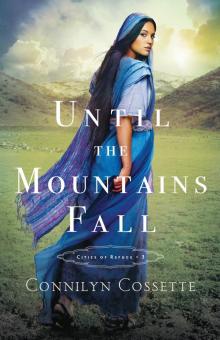 Until the Mountains Fall
Until the Mountains Fall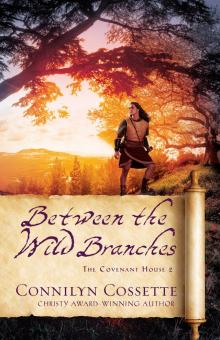 Between the Wild Branches
Between the Wild Branches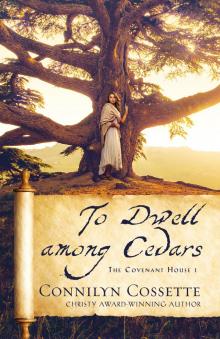 To Dwell among Cedars
To Dwell among Cedars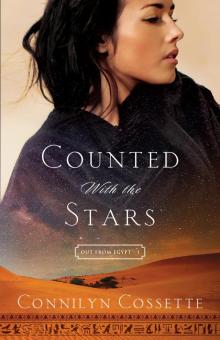 Counted With the Stars
Counted With the Stars Shelter of the Most High
Shelter of the Most High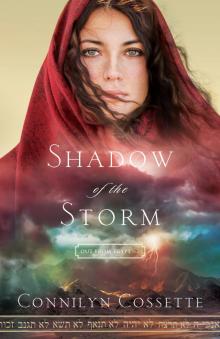 Shadow of the Storm
Shadow of the Storm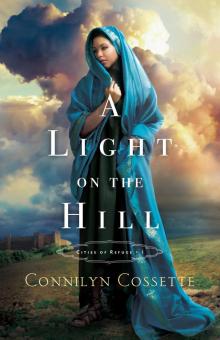 A Light on the Hill
A Light on the Hill Wings of the Wind
Wings of the Wind